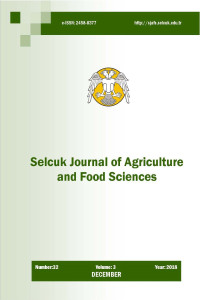Öz
Barley accessions collected from South-West part of Central Anatolia, Turkey, were evaluated for seed protein for two seasons. A wide range of variation (6 to 19%) was found in the germplasm studied during both seasons. Maximum accessions exhibited 12.1-15% protein, whereas few accessions produced more than 16% protein. Correlation between two seasons’ data (r=0.417**) was highly significant indicating the influence of environment component. Germplasm were classified on the basis of areas located, altitude and lemma colour in the region referred. Thus, accessions from Eastern areas possessed average higher protein percentage followed by accessions from Southern areas. Classification on the basis of altitude showed that the accessions collected from 900-1100 masl (meters above sea level) had lower protein while those collected from higher levels had higher protein. According to lemma colour, accessions with white lemma are more situated in the lower levels while those collected from higher levels had dark lemma. In this way, the study provides information on important protein sources of barley germplasm.
Anahtar Kelimeler
Ayrıntılar
| Birincil Dil | İngilizce |
|---|---|
| Konular | Agronomi |
| Bölüm | Araştırma Makalesi |
| Yazarlar | |
| Yayımlanma Tarihi | 28 Aralık 2018 |
| Gönderilme Tarihi | 28 Ağustos 2018 |
| Yayımlandığı Sayı | Yıl 2018 Cilt: 32 Sayı: 3 |
Kaynak Göster
Selcuk Journal of Agriculture and Food Sciences Creative Commons Atıf-GayriTicari 4.0 Uluslararası Lisansı (CC BY NC) ile lisanslanmıştır.

